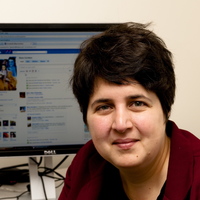
Jenny Kennedy
My PhD thesis analyses subjective practices and the labour of sharing with teletechnologies, for such qualitative studies on practices of sharing are under-represented in theoretical, legal and commercial considerations of sharing. Through qualitative research I ask whether the term ‘sharing’ is in fact meaningful. I consider what it is that can be shared, where and how sharing takes place, how sharing practices are experienced and the tensions that exist in their enactment. In doing this I examine discourses of identity in subjective representations of sharing practices, the social and mediated affordances (and barriers) to sharing practices, and consider the tensions between experiential practices of simultaneity and spatiality.
The ubiquity and everydayness of the term ‘sharing’ belies the diverse and complex social and economic processes it describes. There are popular and critical contexts in which the term is used strategically, such as teletechnology, the internet, and social media platforms, to frame an enablement of user-generated content which downplays the commercial interests of such platforms. Examination of theoretical perspectives on sharing likewise reveals disparities in the provenance of language, and requires interpretation.
Available studies have focused on the spectre of gift-giving in peer-to-peer networks, what Castells (2009) terms the ‘culture of sharing’ and the criminalisation of such activities. There is a need to examine how 'sharing' is used discursively to frame particular activities (especially in a digital or communicative context). As Gillespie's (2010) analysis of the term 'platform' demonstrates, there is value in a rigorous examination of the rhetoric of such ubiquitous terms to understand what is prioritised and what is omitted, effaced or ignored. This thesis undertakes such an examination.
The ubiquity and everydayness of the term ‘sharing’ belies the diverse and complex social and economic processes it describes. There are popular and critical contexts in which the term is used strategically, such as teletechnology, the internet, and social media platforms, to frame an enablement of user-generated content which downplays the commercial interests of such platforms. Examination of theoretical perspectives on sharing likewise reveals disparities in the provenance of language, and requires interpretation.
Available studies have focused on the spectre of gift-giving in peer-to-peer networks, what Castells (2009) terms the ‘culture of sharing’ and the criminalisation of such activities. There is a need to examine how 'sharing' is used discursively to frame particular activities (especially in a digital or communicative context). As Gillespie's (2010) analysis of the term 'platform' demonstrates, there is value in a rigorous examination of the rhetoric of such ubiquitous terms to understand what is prioritised and what is omitted, effaced or ignored. This thesis undertakes such an examination.
less
Related Authors
Simone Natale
Università degli Studi di Torino
Paolo Magaudda
Università degli Studi di Padova
Gabriele Balbi
Universita' della Svizzera Italiana
Jeremy Morris
University of Wisconsin-Madison
Mél Hogan
Queen's University at Kingston
Peter Unwin
York University
Peter Buse
University of Liverpool
Sergio Minniti
Universitas Mercatorum
Kelly Gates
University of California, San Diego
Ilana Gershon
Rice University
InterestsView All (23)









Uploads
Published Papers by Jenny Kennedy
Unintended Consequences aims to discuss to what degree it is necessary for us to rethink our current ideological and practical conceptions of the Internet. Its speakers will address and explore issues surrounding the following:
- From both a capitalist and counter-cultural perspective, did the Internet develop in the 1990s into, what Georges Sorel would call ‘social myth,’ an inspiring fiction?
- If so, how have our aspirational visualisations of the Internet developed since the 1990s (e.g. as a democratizing space, as the free market in its purest form)?
- Are the Western values of freedom and the individual that underpin our expectations of the Internet being subverted by its unregulated nature?
- Is there a common ‘intentionality’ to the Internet and if so, how can we mitigate against the various ‘unintended consequences’?
- Are good intentions ‘good enough’ to explore the limits of ‘hive mind’ and ‘crowd-sourcing’ projects? Or will these concepts come into their own through more corrupt means?
- Are we witnessing the establishment of a global social brain?
- In what sense is ‘truth’ and ‘reality’ becoming endorsed (or not) as relative concepts online (e.g. through ‘play,’ social media profiling, collaborative editing - Wikipedia)?
- Is social networking introducing a new paradigm for morality in our everyday lives?
- What exactly are we sharing when we ‘share’ online? To what extent do we affirm or concede parts of our own identity in discursive practices on social media platforms?
- To what extent is intrusive, Internet surveillance tolerated by the general public who wish to benefit from combined online connectivity and locality to ‘personalize’ place?
Presenters:
Marcus Breen of Bond University exposes the social myth of ‘web 2.0 society’ by confronting us with two dystopian aspects of Internet culture: pornography and jihadism. Breen argues that transgressive knowledge circulates freely through the individual’s private engagement with Internet via the computer monitor, thereby dissolving the previous collective nature of media consumption and its societal principles.
Artist, games researcher and media scholar at La Trobe University, Hugh Davies is the creator of the Alternate Reality game, The Darkest Puzzle, a game that explores the ethical limits of serious gamification. Inspired by the events of 9/11, The Darkest Puzzle leads gamers through a labyrinth of evidence, conspiracies and game meta discussion. Davies offers a critical approach the “hive mind” and popular phenomena, such as “crowd-sourcing”.
Scott McQuire, media scholar and urban theorist at the University of Melbourne, focuses on the permeating impact of networks on situated and material spaces of the urban everyday. McQuire addresses the ambivalent nature of pervasive networks in terms of the spontaneity and serendipity so important to the modern city, as well as their utilization as intensive integrated surveillance.
Alex Lambert probes aspects of the mediated gaze and intimacy on Facebook through his research into social media at Melbourne University. Many have identified the voyeuristic enticements of Facebook publicity, though this is only part of the story. Lambert explores how users experience a paradoxical moral backlash against mediated watching. This 'desire not to see' has socio-cultural significance that escapes popular theories of privacy on social network services.
Based at Swinburne University, social media researcher, Jenny Kennedy, critiques the rhetoric of sharing in social media with special emphasis on the cultural imaging of these practices. She argues for the need to examine how 'sharing' is used discursively to frame particular activities in a digital or communicative context in particular. Moreover, sharing is being utilized as a rhetorical neutralizer between three social media actors: those that provide content to social media platforms; those that 'own' such data; and those that access and make use of it.
Drawing on the concept of affordances (Gibson, 1977, 1986; Norman, 1988; Hogan, 2009) and the work of Doreen Massey (1994, 2005, 2009), it can be shown that subjects act on perceived affordances in narratives of online and offline relations which intersect to produce the spaces in which social interactions are situated.
This chapter proposes the concept of ‘networked spaces’ as a strategy for resolving the problematic binary of online and offline. Networked spaces are dynamic, the contexts or narratives within them relational. It is through the lived experiences of interactions in these spaces that the contexts of social interactions are suggested to be best examined.
Unintended Consequences aims to discuss to what degree it is necessary for us to rethink our current ideological and practical conceptions of the Internet. Its speakers will address and explore issues surrounding the following:
- From both a capitalist and counter-cultural perspective, did the Internet develop in the 1990s into, what Georges Sorel would call ‘social myth,’ an inspiring fiction?
- If so, how have our aspirational visualisations of the Internet developed since the 1990s (e.g. as a democratizing space, as the free market in its purest form)?
- Are the Western values of freedom and the individual that underpin our expectations of the Internet being subverted by its unregulated nature?
- Is there a common ‘intentionality’ to the Internet and if so, how can we mitigate against the various ‘unintended consequences’?
- Are good intentions ‘good enough’ to explore the limits of ‘hive mind’ and ‘crowd-sourcing’ projects? Or will these concepts come into their own through more corrupt means?
- Are we witnessing the establishment of a global social brain?
- In what sense is ‘truth’ and ‘reality’ becoming endorsed (or not) as relative concepts online (e.g. through ‘play,’ social media profiling, collaborative editing - Wikipedia)?
- Is social networking introducing a new paradigm for morality in our everyday lives?
- What exactly are we sharing when we ‘share’ online? To what extent do we affirm or concede parts of our own identity in discursive practices on social media platforms?
- To what extent is intrusive, Internet surveillance tolerated by the general public who wish to benefit from combined online connectivity and locality to ‘personalize’ place?
Presenters:
Marcus Breen of Bond University exposes the social myth of ‘web 2.0 society’ by confronting us with two dystopian aspects of Internet culture: pornography and jihadism. Breen argues that transgressive knowledge circulates freely through the individual’s private engagement with Internet via the computer monitor, thereby dissolving the previous collective nature of media consumption and its societal principles.
Artist, games researcher and media scholar at La Trobe University, Hugh Davies is the creator of the Alternate Reality game, The Darkest Puzzle, a game that explores the ethical limits of serious gamification. Inspired by the events of 9/11, The Darkest Puzzle leads gamers through a labyrinth of evidence, conspiracies and game meta discussion. Davies offers a critical approach the “hive mind” and popular phenomena, such as “crowd-sourcing”.
Scott McQuire, media scholar and urban theorist at the University of Melbourne, focuses on the permeating impact of networks on situated and material spaces of the urban everyday. McQuire addresses the ambivalent nature of pervasive networks in terms of the spontaneity and serendipity so important to the modern city, as well as their utilization as intensive integrated surveillance.
Alex Lambert probes aspects of the mediated gaze and intimacy on Facebook through his research into social media at Melbourne University. Many have identified the voyeuristic enticements of Facebook publicity, though this is only part of the story. Lambert explores how users experience a paradoxical moral backlash against mediated watching. This 'desire not to see' has socio-cultural significance that escapes popular theories of privacy on social network services.
Based at Swinburne University, social media researcher, Jenny Kennedy, critiques the rhetoric of sharing in social media with special emphasis on the cultural imaging of these practices. She argues for the need to examine how 'sharing' is used discursively to frame particular activities in a digital or communicative context in particular. Moreover, sharing is being utilized as a rhetorical neutralizer between three social media actors: those that provide content to social media platforms; those that 'own' such data; and those that access and make use of it.
Drawing on the concept of affordances (Gibson, 1977, 1986; Norman, 1988; Hogan, 2009) and the work of Doreen Massey (1994, 2005, 2009), it can be shown that subjects act on perceived affordances in narratives of online and offline relations which intersect to produce the spaces in which social interactions are situated.
This chapter proposes the concept of ‘networked spaces’ as a strategy for resolving the problematic binary of online and offline. Networked spaces are dynamic, the contexts or narratives within them relational. It is through the lived experiences of interactions in these spaces that the contexts of social interactions are suggested to be best examined.